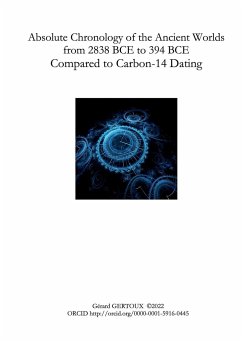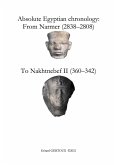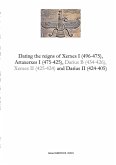The first scientific chronology of the Egyptian civilisation, calculated by Olaf A. Toffteen in his monograph: Ancient Chronology (1907), fixed the beginning of the First Dynasty in 3285 BCE. In their academic study: Ancient Egyptian Chronology (2006), Erik Hornung, Rolf Krauss and David A. Warburton set the beginning of the First Dynasty around 2900 BCE, a rejuvenation of 385 years in one century! This major disagreement has pushed Egyptologists towards carbon-14 dating which claims to scientifically provide absolute dates. According to this "absolute chronology" the First Dynasty must have started around: 2685 BCE (1970), 3185 BCE (1992), 3150 BCE (2013) and now (2019) around 3000 BCE. Furthermore, the beginning of Dynasty 0 (predynastic kings) is dated between 4000 and 3000 BCE, depending on the samples measured. These huge variations show that carbon-14 dating is not an absolute dating. The aim of this monograph is to show that the only absolute chronology is one whose dates are anchored on astronomical events dated in a calendar and back-calculated by astronomical software. Although this monograph is based on my thesis (in French completed in 2009): Scientific approach to an absolute chronology through synchronisms dated by astronomy (https://iaassyriology.com/author/publisher/page/12/), it has been simplified to make the calculation methods and results accessible to a non-specialist audience. The first part of my thesis on Achaemenid chronology has been published in OBO Series Archaeologica 40, 2018, but the second part on Mesopotamian chronology has only been cited by Professors: Dominique Charpin at the 65th Rencontre Assyriologique Internationale at the Collège de France in 2019, Jonathan Rosenbaum (Gratz College) at the 2019 ASOR Annual Meeting in the session: Archaeology and Bible Studies, and Nele Ziegler in her peer-reviewed journal NABU 2021-3.
Hinweis: Dieser Artikel kann nur an eine deutsche Lieferadresse ausgeliefert werden.
Hinweis: Dieser Artikel kann nur an eine deutsche Lieferadresse ausgeliefert werden.








